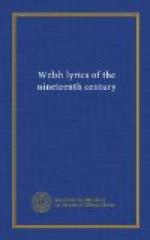TO MY MOTHER.
They flout me as half-English—a disgrace
For which scarce all your virtues can atone,
Mother, in whom I find no flaw but one,
That you are Saxon!—but this fault of race
Fell not on me nor yet, I fear, your grace
Of English speech, else had more smoothly run
These echoes of Welsh Lyrics, and your son
Need not have flinched before the critic’s face.
Such as they are, from your far Yorkshire home
Perchance they may in fancy bid you come,
Pondering past memories, to my native land,
Once more to see fair Mawddach from the bridge,
To mark how Cader rises, ridge on ridge,
Or, where Llanaber guards our dead, to stand.
July, 1896.
PREFACE.
The words “First Series” which appear on the Title Page are intended to show, firstly, that I do not at all consider the present collection in any sense a representative anthology of the Welsh Lyrics of the Century, and secondly, that if this effort meets with approval, I hope to bring out two or three further instalments, one of them, if possible, being from poems written in the “mesurau caethion.” My aim, in fact, is to publish by degrees a collection of translations which might eventually be gathered together in a single volume (with a general introduction and critical notices on each author) so as to form a more or less adequate anthology of our nineteenth century poets. “So runs my dream”: whether it can ever be realized depends of course in a great measure on the reception this first series meets with. That it has many serious defects I well know, nor can I attempt to disarm criticism by pointing out the immense difficulties which confront the man who tries to put Welsh poetry into English rhyme, especially when that man has never written a line of English verse before. But I should be most grateful to readers for any hints or suggestions, by which the faults and imperfections of the present volume may be avoided in a second series. I have retained the metres of the originals with but trifling variations, except in those cases where there was nothing specially characteristic to make this desirable (as e.g., in the case of Islwyn, where I have thrown some of my translations into sonnet form) or where—as in the Song of the Fisherman’s Wife—the metre, even if it could be reproduced, would not in English harmonise with the meaning. I ought perhaps to ask pardon beforehand for the audacity with which I have treated Ieuan Glan Geirionydd’s famous “Morfa Rhuddlan.”
I very gratefully acknowledge the courtesy of the owners of copyright, especially Messrs. Hughes & Son, Wrexham, Mr. O. M. Edwards, and Mr. James Lewis, New Quay (to whom my translation of the “Pauper’s Grave” belongs).
My most cordial thanks are also due to Mr. W. Lewis Jones, Lecturer in English at the University College of North Wales, who though an entire stranger has given me his valuable assistance and advice in seeing these pages through the press.




